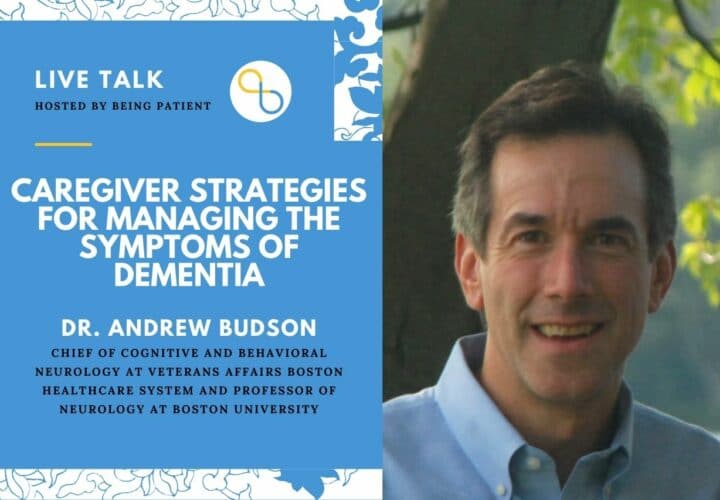Dementia expert and cognitive and behavioral neurologist Dr. Andrew Budson shares guidance for caregivers and family members on managing the symptoms of dementia.
Whether it be coping with the cognitive, behavioral or psychological symptoms of dementia, adapting caregiver strategies throughout the different stages of the illness is difficult for many family members. These symptoms often ebb and flow, and the progression of dementia can be slow but unpredictable. Nonetheless, there are ways for caregivers and their loved ones to adjust to the day-to-day challenges that accompany a dementia diagnosis.
Being Patient spoke with Dr. Andrew Budson, co-author of the forthcoming book Six Steps to Managing Alzheimer’s Disease and Dementia, about techniques for family members to care for a loved one with dementia. Budson, chief of cognitive and behavioral neurology at Veterans Affairs Boston Healthcare System and professor of neurology at Boston University, shared insights on strategies to manage symptoms including memory issues, delusions and hallucinations of people living with dementia.
Being Patient: Who is the target audience of Six Steps to Managing Alzheimer’s Disease and Dementia?
Dr. Andrew Budson: This book is a guide for families to help their loved ones who are entering the moderate stage of Alzheimer’s disease. One way that you know it’s coming is the doctor switches from talking 90 percent to the patient, 10 percent to the family, to talking 90 percent to the family, 10 percent to the patient.
We have another book, Seven Steps to Managing Your Memory: What’s Normal, What’s Not, and What to Do About It, which is actually written specifically and directly to the individual who’s noticed some memory problems. It’s in these early stages that it’s very difficult for the individual to come to terms that they’re forgetting.
Number one, psychologically, it’s not pleasant to think about the fact that you’re forgetting things, to worry about the fact that you’re developing Alzheimer’s disease, but in addition, from a neurological standpoint, people actually have trouble remembering the fact that they forget everything.
Being Patient: In your new book, you wrote about the importance of paying attention for helping us remember. What can we do for someone with dementia to maintain their focus?
Dr. Andrew Budson: All of us in society today, regardless of what age one is and whether you have ADD (attention deficit disorder) or dementia or anything else, are very distracted. You’re watching a Zoom presentation but your email is still on. You’re hearing a bing and you’re being distracted by that. Well, we can actually only pay attention to one thing at a time. When people are paying attention to two things, they’re not really paying attention to two things. They’re switching back and forth.
You can only remember what you’re paying attention to. I think most of us have had the experience [of] talking to a friend at the same time [as when] you’re driving. All of a sudden, you end up somewhere [and] you’re like, ‘I don’t have any memory of how I drove here.’ That’s because you weren’t paying attention to your driving. You have to pay attention in order to even have the possibility of remembering it, even for normal individuals.
In the earliest stages [of Alzheimer’s], we want to encourage the individual to not dual task. Maybe they were used to doing a million different things at once. They’re used to driving while they’re talking on the phone and things like that. You have to encourage your loved one who’s only mildly impaired [and] be like, ‘I want you to be able to keep driving and doing it safely. You can if you just turn off the radio, stop talking on the telephone, certainly don’t look at your phone while you’re driving, and just pay attention.’
For individuals in the later stage of the disease, it’s more just to help them be there, be present, be in the moment, be with you, and often that means turning off distractions. In the later stages, you as the family member have to take the lead and turn the TV off, go into another room if you’re trying to have a quiet conversation away from the kids or the pets or whatever other distractions are around.
Being Patient: For people with dementia, long-term memories can still be preserved. Why is that?
Dr. Andrew Budson: Memories are formed and initially stored in a small structure deep in the temporal lobe called the hippocampus. It’s the hippocampus that allows us to remember what we did 10 minutes ago, what we did yesterday and last year. Over time, mainly as we’re sleeping, the memories get represented throughout the whole brain.
In Alzheimer’s disease, the hippocampus and related structures deteriorate. They get attacked by the Alzheimer’s proteins. The ability to learn new information is lost. The recent memories are lost and all that’s left are the older memories. Your mother is talking more and more about things that happened long ago, because those are the memories that are the ones that are present for her. The newer memories may have been lost by the Alzheimer’s process.
Being Patient: Is it helpful to jog the long-term memories of people with dementia?
Dr. Andrew Budson: I think that it is often pleasant and pleasurable for someone to be able to bring up a memory. I think that if you can give a little hint and say, ‘That was the show that we went to 20 years ago,’ and if your mother can then say, ‘Oh, I remember. Yes, that was a wonderful show. We really had a nice time and I enjoyed spending time with you and your partner,’ then I think that it’s great.
If you find these prompts are just providing frustration and your mother is not able to pull the memory, then obviously that’s probably not the right thing to do. If your question is: ‘Is it going to be helpful at a neurobiological level?’ I don’t think it’s critically important. I think the most important thing is to do it if it creates a moment of joy.
Being Patient: Hallucinations and delusions are among the hardest to symptoms of dementia to cope with. Tell us what are some of the strategies that can help?
Dr. Andrew Budson: A delusion is when there’s a fixed mistaken belief. A frequent one that I hear is that someone is convinced that their mother or someone else came to visit them last night, [doing] something unpleasant [like having] an argument. To try to convince the person that, ‘No, that actually happened 50 years ago, Mom. That didn’t happen last night,’ isn’t usually helpful. You’re usually not going to win that type of logical argument.
We usually recommend that you simply distract the person, get them talking about something else. You say, ‘Yeah, that’s too bad. Hey, let me tell you what happened to me today. You won’t believe what happened,’ and launch into a story, or sometimes, you could pull out an old picture and say, ‘Let’s take a look at some pictures of your parents and let’s go through some old photo albums.’ Things like that can sometimes turn a negative event into a positive event, but you definitely don’t want to be arguing with someone.
The main difference in hallucinations is of course that it’s happening in front of somebody. Somebody might be noticing that a person is sitting in a chair when there’s no one sitting in the chair, or there may be people walking around doing different things.
Hallucinations are often non-threatening. Most of the time, at least initially, individuals with hallucinations — normally it’s people that have at least some Lewy body pathology in the brain — will often see people or animals. I think the most important thing for family members to know is to not get upset about it.
The important thing to do is to try to redirect the person. Get them talking about things that are actually reality-based. But if they’re interacting with the hallucination and it’s not bothering them, don’t let it bother you. Let them spend a few minutes with the hallucination. I’ve had patients who enjoy petting animals that aren’t actually there, and sometimes enjoy that someone has visited them and given them company if they’re living alone.
If the hallucinations are threatening, I recommend using what we call the four Rs. Number one: reassure the patient that everything’s okay. Number two: reconsider, so consider things from the individual’s point of view. Number three is redirect, directing them to other activities. The fourth is relax. That’s what we all need to do: to take a deep breath and relax because if we are upset that our loved one is having a hallucination or we’re anxious or angry or frustrated, we’re going to reflect that emotion to the individual and it’s just going to escalate things.
Being Patient: Let’s discuss medications in Alzheimer’s. Can you give us an overview of how cholinesterase inhibitors work?
Dr. Andrew Budson: Medicines like donepezil (brand name Aricept), rivastigmine (Excelon), galantamine (Razadyne) help to raise up a neurotransmitter called acetylcholine, which drops in Alzheimer’s, vascular dementia and Lewy body dementia. By raising it up, what the studies clearly show is you can actually turn the clock back on these dementias by six to 12 months. For six to 12 months, the person is actually somewhat better than they were initially.
When someone comes into my clinic and I prescribe one of these medications, I can make their memory like it was six months ago, or maybe even a full year ago. The earlier I see them and get them on [a medicine], the more likely it is I can turn the clock back a full 12 months because there are more living brain cells.
Over time, I cannot stop the clock from ticking down. It’s still going to tick down. It’s even going to tick down at the same rate, but as long as they initially had that turning [of] the clock back, they’re always going to be six to 12 months better off on the medicine. One of the terrible ways that I know this is correct is if they stopped the medicine, what happens is they often plummet six to 12 months worth of memory function in one to two weeks.
Being Patient: How can families and patients tell if these medications are helping or not?
Dr. Andrew Budson: One thing that is tricky about medications to treat any problem, whether it’s to improve memory, to treat trouble with agitation, to treat hallucinations and anger, is that it’s unlikely to stop these problems or fix these problems completely. But it is likely, if it’s working, to make a significant difference. How do you know? You have to do your homework and write down, ‘How many times does my loved one get angry? How long does each episode last?’
Let’s say they’re getting angry every single day, and you add up all the times and it seems to average about 35 minutes each day that they’re angry, yelling, screaming, pounding, aggressive, something like that. Then [with a] new medicine, you find that now they’re only angry four times a week. You total the time and it’s only about 17 minutes each day: It’s still happening, but it’s a lot better. That’s one very helpful tool to try and see [if the medicine has] helped although the problem isn’t completely eliminated.
The interview has been edited for length and clarity.
Contact Nicholas Chan at nicholas@beingpatient.com



